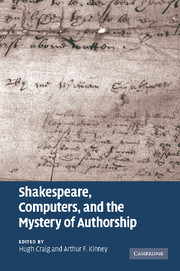Book contents
- Frontmatter
- Contents
- List of figures
- List of tables
- Notes on contributors
- Preface and acknowledgments
- 1 Introduction
- 2 Methods
- 3 The three parts of Henry VI
- 4 Authoring Arden of Faversham
- 5 Edmond Ironside and the question of Shakespearean authorship
- 6 The authorship of The Raigne of Edward the Third
- 7 The authorship of the Hand-D Addition to The Book of Sir Thomas More
- 8 The 1602 Additions to The Spanish Tragedy
- 9 Transforming King Lear
- Conclusion
- Appendix A Plays in the corpus
- Appendix B A list of 200 function words
- Glossary
- Index
- References
5 - Edmond Ironside and the question of Shakespearean authorship
Published online by Cambridge University Press: 06 January 2010
- Frontmatter
- Contents
- List of figures
- List of tables
- Notes on contributors
- Preface and acknowledgments
- 1 Introduction
- 2 Methods
- 3 The three parts of Henry VI
- 4 Authoring Arden of Faversham
- 5 Edmond Ironside and the question of Shakespearean authorship
- 6 The authorship of The Raigne of Edward the Third
- 7 The authorship of the Hand-D Addition to The Book of Sir Thomas More
- 8 The 1602 Additions to The Spanish Tragedy
- 9 Transforming King Lear
- Conclusion
- Appendix A Plays in the corpus
- Appendix B A list of 200 function words
- Glossary
- Index
- References
Summary
In 1932, Muriel St Clare Byrne drew the following distinction between authentic authorial style and the conventional ‘tricks’ of the commercial theatre: ‘The Mundays and the Chettles have their tricks of expression, but because they are just tricks they or anybody else can use them. Tricks are catching: style is not’. Byrne's simple observation reveals a manifest truth about authorship attribution and the Early Modern English stage. It is perplexing that so many subsequent critics have ignored her useful advice. This is especially true when considering the fraught role of internal evidence in many failed attribution projects, which have employed suspect methodologies in order to highlight affinities in ‘tricks’ between anonymous plays and known playwrights. The case of the anonymous Edmond Ironside serves as a prime example of this practice. The only critics who have attributed an author to the play – E. B. Everitt and Eric Sams – failed to build their arguments on anything stronger than verbal parallels. These features of a dramatic text typically reflect the mere ‘tricks’ of theatrical convention rather than the subtle linguistic nuances of authorial style.
Yet one has to give Everitt and Sams credit for trying to build an authorship case on the dearth of evidence the play provides. When trying to prove authorship for a play such as Ironside, for which no definite date, publication, or performance record exists, internal substantiation is the only way to proceed.
- Type
- Chapter
- Information
- Shakespeare, Computers, and the Mystery of Authorship , pp. 100 - 115Publisher: Cambridge University PressPrint publication year: 2009



